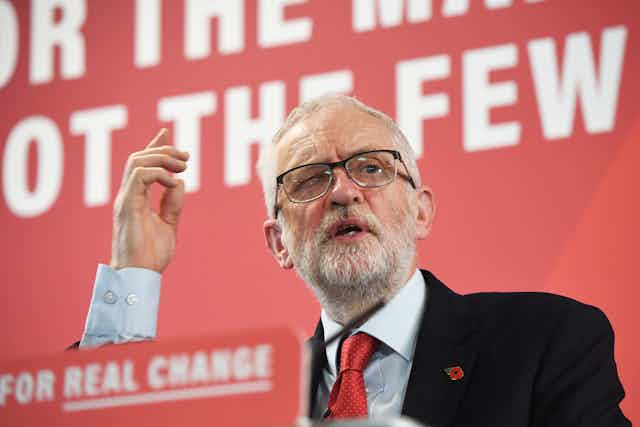Does the Labour Party yet know what to make of Boris Johnson? On the basis of Jeremy Corbyn’s launch speech, and the campaign so far, I don’t think so.
This is a perennial challenge for political parties – one they tend to wrestle with when a new leader emerges on the scene. The Tories struggled to define Tony Blair, Labour struggled to define David Cameron – even suggesting that “Dave the Chameleon”, changed so often he was difficult to define.
Part of any election campaign is defining your opponent, and seeking to get the public on board with that definition. This was less of a problem for Labour when it was taking on Theresa May. While the opposition hadn’t really troubled May in her early months, the 2017 general election campaign changed everything. The media coverage in that campaign defined the then prime minister better than any party could. The “Maybot” wouldn’t change course. She was inflexible and she was asking the country to vote for more of the same. Johnson will be only too aware of the mistakes May made.
Trump and the NHS
There are signs Labour is tempted to lean in to the connection between Johnson and US president Donald Trump for this campaign. Johnson, so this opposition narrative goes, is in Trump’s pocket. He will sell parts of the NHS to US companies if the terms of a post-Brexit trade deal make that necessary.
This brings some Johnson “definition” together with the issue of the future of the NHS – a central pillar of the Labour campaign. Corbyn included lines on this in his opening speech, and will certainly be repeating them: “Labour won’t let Donald Trump get his hands on our National Health Service”.
Another important theme is Johnson’s reasoning for calling an election in the first place. The prime minister speaks of his reluctance to go to the polls, insisting his hand has been forced by an obstructive parliament that continues to block his Brexit deal.

The problem here, of course, is that parliament voted to approve Johnson’s deal at the second reading stage of the legislation needed to ratify it. Far from blocking it, MPs had signalled their willingness to proceed on debating the detail of a Brexit deal. Researchers at UK in a Changing Europe have looked at the numbers and judged that Johnson would likely have succeeded in getting his Brexit deal through all of its parliamentary stages had he stuck with the process. Instead, he pushed for an election he claimed he didn’t want.
There is potential for a very clear campaign message for Corbyn here. The question: “Why are you having this election?” came up in the 2017 campaign and was never satisfactorily answered by May.
Many saw her decision to call a snap vote as an opportunistic attempt to capitalise on her lead in the polls. She, however, also claimed she was being forced into it. Labour and Brussels were frustrating the progress of Brexit, she argued, and the only option was to “strengthen her hand” to get the job done. This seemed odd given that May’s Brexit plan – at that time – was oblique. It was difficult to see how Brexit was being frustrated and her argument on the campaign trail appeared weak.
She then went on to launch a manifesto that failed to address the “burning injustices” she had pledged to tackle in office, similarly begging the question as to why an election was being called. Labour’s message was much more positive – and May lost her majority.
An election no one wants
Now, in 2019, the argument from Johnson that an election is required to “get Brexit done” is pretty questionable at best. Pressing this point to Johnson is a strong option for Corbyn, particularly in televised debates. The self interest of calling an election when you don’t actually need one - at least for the principle reason being given - may not go down well.
Johnson has, through his rhetoric and political management, tried to change the political context he inherited from May. He has sought to demonstrate enhanced commitment to a no-deal outcome if a deal fails, and embraced a different kind of diplomacy with the EU.
Switching from the pursuit of a deal to an election is a gamble for the prime minister, and one Labour could easily highlight to help define Johnson’s tenure. We will know by mid-December if he is a leader who lost a gamble because he wanted too much, or a leader who managed to get exactly what he wanted.


